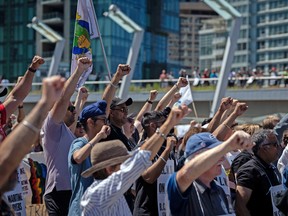The authors concluded that governments’ willingness to step in has led to less serious ‘surface bargaining,’ ultimately making it harder for real settlements to be reached

The strike in the first two weeks of July 2023 ground Pacific imports and exports to a standstill: roughly one-quarter of the country’s trade flows through B.C. docks. Officially, the strike lasted 13 days, but after union leadership rejected an initial settlement, it appeared workers could go back on the picket line until a federally appointed mediator reached a deal that was ratified by both sides in early August.
Afterward, then labour minister Seamus O’Regan contracted industrial-relations professor Athony Giles and labour-law professor Kevin Banks, both of Queen’s University, to look into whether there were systemic issues that undermined labour peace at the vital port.
They concluded that governments’ willingness to step in and end labour disruptions has led to less serious “surface bargaining” in contract disputes, ultimately making it harder for real settlements to be reached, according to their report, which National Post obtained through an access-to-information request.
Giles said both sides knew the federal government was unlikely to allow a port strike to go on for an extended period of time.
“If the parties expect the government to jump in and call a halt to a strike or a lockout, then they bargain with that in mind,” he said in an interview. “They keep in their back pockets concessions that in normal bargaining they might, at the last minute, put forward just to see if they can get an agreement.”
According to a House of Commons committee that studied the 2023 strike, the shutdown reduced Canada’s GDP between $730 million and $980 million. It diverted an estimated $10 billion in trade and impacted a wide variety of industries.
Banks, the report’s co-author, said the government likely can’t ignore a labour stoppage on this scale, but it also can’t seem overly eager to settle disputes.
“The government probably can never be seen to just say ‘we’re going to take a hands-off approach to such an important set of issues,’” Banks said. “But if they are seen to be ready to jump in right away, without forcing the parties to make any hard choices, then you’re just going to get the same problems reoccurring.”
Another problem the authors identified was with economic incentives motivating both the B.C. port employers and the port-workers’ union.
The International Longshore and Warehouse Union, which struck last year in B.C., represents workers across the ports, but many of its members are casual workers without the same rights as union members. The casual workers are the first to lose work when port business slows down — and even the threat of a strike will slow shipments, as some shippers begin to hold back or choose other ports. But during those slowdowns, union members are protected from any real loss of work. Giles said that gives them more room to dig in their heels on issues.
“If a strike or a lockout, a long work stoppage reduces business at the port and therefore reduces job opportunities, well, the members of the union are protected, because there’s this buffer.”
The pair identified issues with the structure of the employer group as well. The British Columbia Maritime Employers Association (BCMEA) is the management side of the table in any discussion with the union, but it represents people who directly employ dockworkers as well as ship owners and other groups who don’t have as direct a stake in the negotiations.
In the case of the potential strike that is looming over the ports today, workers initially attempted to strike only against one employer in the association, but that strike was ruled out of bounds and workers are now threatening a strike across the port system.
Giles and Banks’ report was submitted in January and O’Regan appointed an industrial inquiry commission to further review the issues. O’Regan, who left cabinet this summer, said at the time that there was a need for a real solution.
“The workers and businesses that depend on our West Coast ports deserve long-term solutions. They deserve solutions that respect the collective bargaining process. They deserve stability and certainty in our supply chains,” he said.
The inquiry is being headed up by longtime federal mediators Vincent Ready and Amanda Rogers, and is set to report back next year.
This isn’t the first time these problems have been raised.
A 2010 report on port labour came to similar conclusions as did Giles and Banks, and called for an industrial inquiry, which did not take place.
And an industrial inquiry commission in 1995 called for similar changes to what Banks and Giles suggested, but was not acted on.
BCMEA president and CEO Mike Leonard said his group is committed to working with the new industrial inquiry.
“We welcome the work of the Industrial Inquiry Commission under the leadership of Mr. Ready and Ms. Rogers,” he said. “We are fully participating in the process now with the sincere hope their work will lead to meaningful change, and long-term stability for Canada’s West Coast ports.”
Our website is the place for the latest breaking news, exclusive scoops, longreads and provocative commentary. Please bookmark nationalpost.com and sign up for our daily newsletter, Posted, here.